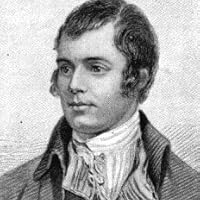Robert Burns Quotes
Quotes tagged as "robert-burns"
Showing 1-13 of 13

“Some hae meat and canna eat,
And some wad eat that want it,
But we hae meat and we can eat,
And sae the Lord be thankit.”
―
And some wad eat that want it,
But we hae meat and we can eat,
And sae the Lord be thankit.”
―

“Is it possible that the Pentateuch could not have been written by uninspired men? that the assistance of God was necessary to produce these books? Is it possible that Galilei ascertained the mechanical principles of 'Virtual Velocity,' the laws of falling bodies and of all motion; that Copernicus ascertained the true position of the earth and accounted for all celestial phenomena; that Kepler discovered his three laws—discoveries of such importance that the 8th of May, 1618, may be called the birth-day of modern science; that Newton gave to the world the Method of Fluxions, the Theory of Universal Gravitation, and the Decomposition of Light; that Euclid, Cavalieri, Descartes, and Leibniz, almost completed the science of mathematics; that all the discoveries in optics, hydrostatics, pneumatics and chemistry, the experiments, discoveries, and inventions of Galvani, Volta, Franklin and Morse, of Trevithick, Watt and Fulton and of all the pioneers of progress—that all this was accomplished by uninspired men, while the writer of the Pentateuch was directed and inspired by an infinite God? Is it possible that the codes of China, India, Egypt, Greece and Rome were made by man, and that the laws recorded in the Pentateuch were alone given by God? Is it possible that Æschylus and Shakespeare, Burns, and Beranger, Goethe and Schiller, and all the poets of the world, and all their wondrous tragedies and songs are but the work of men, while no intelligence except the infinite God could be the author of the Pentateuch? Is it possible that of all the books that crowd the libraries of the world, the books of science, fiction, history and song, that all save only one, have been produced by man? Is it possible that of all these, the bible only is the work of God?”
― Some Mistakes of Moses
― Some Mistakes of Moses

“I have embraced Robert Burns and his beloved Scotland. I have heard the music of the authentic mother tongue. I have walked where he walked, lived where he lived, if only for a brief time, and seen where he died and where he was finally laid to rest. The ghost of Rabbie Burns will continue to walk beside me. And when I am gone, I will walk beside others who fight for the cause of truth.”
― The Ghost of Rabbie Burns: An American Poet's Journey Through Scotland
― The Ghost of Rabbie Burns: An American Poet's Journey Through Scotland

“Freedom is an idea that no tyrant will ever crush.”
― The Ghost of Rabbie Burns: An American Poet's Journey Through Scotland
― The Ghost of Rabbie Burns: An American Poet's Journey Through Scotland

“The kid was swell. He was walking in the street, instead of on the sidewalk, but right next to the curb. He was making out like he was walking a very straight line, the way kids do, and the whole time he kept singing and humming. I got up closer so I could hear what he was singing. He was singing that song, 'If a body catch a body coming through the rye.' He had a pretty little voice, too. He was just singing for the hell of it, you could tell. The cars zoomed by, brakes screeched all over the place, his parents paid no attention to him, and he kept on walking next to the curb and singing 'If a body catch a body coming through the rye.' It made me feel better. It made me feel not so depressed any more.”
― The Catcher in the Rye
― The Catcher in the Rye

“To me, Burns expressed, in its most succinct form, the ideal and the essence of socialism — which had to do with justice, liberty and the overthrow of tyranny.”
― My Granny Made Me an Anarchist. The Christie File: Part 1, 1946 - 1964
― My Granny Made Me an Anarchist. The Christie File: Part 1, 1946 - 1964
“Robert Burns wrote, "[t]he best laid schemes o' Mice an' Men [g]ang aft agley," which can be roughly translated to "not so fast, assholes.”
― LA to LA
― LA to LA

“They say we Highlanders take in dancin' wi’ our mother’s milk!” said Tam.
“You must have skipped your breakfast that day then!” said Souter Johnnie.”
― Tam: The Three Changelings
“You must have skipped your breakfast that day then!” said Souter Johnnie.”
― Tam: The Three Changelings

“And what is it that you believe in, Tam?” said the Cutty Sark, smiling. “In life? In love? In happiness? You don’t even know what they really are, none of you do! You’ve been deceived, by the greatest trick of them all! Here you live, like fabricated ships in a bottle. You can see the elements around you, but you can’t feel them- can’t even touch them…” She put her hand on his cheek again, and this time he didn’t move it away. “There’s a king, and a law, and a church, and they tell you exactly who you are, what you want- what you can have, and what you can dream of! But they’re just part of the deception, can’t you see? They’re just an illusion, a child’s play-thing, ready to be washed away like sand-castles on the beach when the tide comes in. Man-made institutions can never hold out against the real world forever. Against our world. Love it, hate it, desire it, fear it- but you can’t escape it!”
― Tam: The Three Changelings
― Tam: The Three Changelings

“Callum pulled a sgian dubh from out of his stocking and slammed it into the door-frame, where it lodged deep into the wood.
“They call it the black knife,” he said. “But it is true steel. That’ll keep the witches frae’ your door at least, Mistress Nansie! Dia leat!”
Nansie squeezed his hand.
“Dia leat! God with you too, my son!”
Callum crossed himself, touched the blade of the sgian dubh for luck and then padded softly down the stairs after the others.
“Tapadh leat mo mhàthair!” he called back quietly. “But somethin’ tells me there’s no God where we’re headed…”
He stepped out onto the moor, and plunged on into the darkness, until it swallowed him too.”
―
“They call it the black knife,” he said. “But it is true steel. That’ll keep the witches frae’ your door at least, Mistress Nansie! Dia leat!”
Nansie squeezed his hand.
“Dia leat! God with you too, my son!”
Callum crossed himself, touched the blade of the sgian dubh for luck and then padded softly down the stairs after the others.
“Tapadh leat mo mhàthair!” he called back quietly. “But somethin’ tells me there’s no God where we’re headed…”
He stepped out onto the moor, and plunged on into the darkness, until it swallowed him too.”
―

“Scotland forever, ya bass!” said Tam, rocking back and landing the perfect head-butt on Rannoch’s nose.”
― Tam: The Three Changelings
― Tam: The Three Changelings

“Finally Mary understood everything. For the music, as it wound its way through that quiet countryside, scampering and chuckling gleefully along the pebbled shores of the River Doon, sweeping up hill and over moor, dancing in the wind over the purple-fringed sea-shore, told the story of Scotland. It told of the first great magic that had taken root so many millennia ago, and of the younger powers that had come along afterwards to vie with it. It told the deep secrets that Rannoch had spent so many lifetimes searching for, and would never guess at now, as though they were the passing gossip of a market-day. It told tales of great wrongs, of unbearable suffering- and of endless forgiveness and rebirth.”
― Tam: The Three Changelings
― Tam: The Three Changelings
All Quotes
|
My Quotes
|
Add A Quote
Browse By Tag
- Love Quotes 97k
- Life Quotes 75.5k
- Inspirational Quotes 72.5k
- Humor Quotes 43.5k
- Philosophy Quotes 29.5k
- Inspirational Quotes Quotes 27k
- God Quotes 26k
- Truth Quotes 23.5k
- Wisdom Quotes 23.5k
- Romance Quotes 23k
- Poetry Quotes 22k
- Death Quotes 20k
- Happiness Quotes 18.5k
- Life Lessons Quotes 18.5k
- Hope Quotes 18k
- Faith Quotes 18k
- Quotes Quotes 16.5k
- Inspiration Quotes 16.5k
- Spirituality Quotes 15k
- Religion Quotes 15k
- Motivational Quotes 15k
- Writing Quotes 14.5k
- Relationships Quotes 14.5k
- Life Quotes Quotes 14k
- Love Quotes Quotes 13.5k
- Success Quotes 13.5k
- Time Quotes 12.5k
- Motivation Quotes 12k
- Science Quotes 11.5k
- Knowledge Quotes 11k


